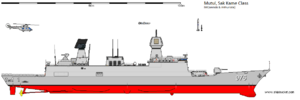Sak Kame-class destroyer

| |
| Class overview | |
|---|---|
| Name: | Mamlab-class frigate |
| Operators: | Royal Mutulese Navy |
| Preceded by: | Mamlab-class destroyer |
| General characteristics | |
| Type: | Destroyer |
| Displacement: | 5,800 tonnes full load |
| Length: | 150m |
| Beam: | 17.4m |
| Draught: | 9.5m |
| Propulsion: | 2-shaft CODOG system, 2x gas turbines, 2x diesel engines |
| Speed: | 29kn |
| Range: | 4,500 nautical miles at 18 knots |
| Complement: | 300 |
| Sensors and processing systems: |
|
| Armament: |
|
| Armour: | steel shrapnel sheets, kevlar spall liners |
| Aircraft carried: | 1 x ASW helicopter |
The Sak Kame-class is a destroyer design in service with the Royal Mutulese Navy. The successor of the Mamlab-class destroyer, it is currently the most advanced class of surface combatants in Mutulese service.
The Sak Kame is a revolutionary development for the RMN, introducing new indigenous technological suites which allow it to catch up to the most technologically advanced naval forces in the world. Its combination of an AESA X-band fire control radar, and an L-band volume search radar, allows it to simultaneously track hundreds of air targets and to engage them with anti-air missiles. The latter is also capable of tracking stealthy aircraft or cruise missiles at long range, as well as assist the ship in engaging ballistic missiles. Complementing these are its anti-ship weaponry, which consists of eight anti-ship cruise missiles, which may also be used for land-attack. Altogether, these capabilities allow the Sak Kame to function as the flagships of escort squadrons protecting Mutulese naval task groups.